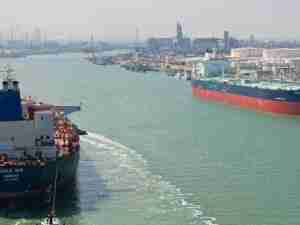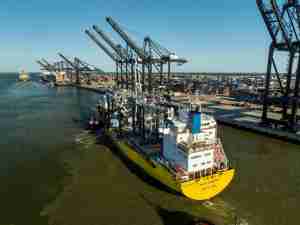He suddenly slipped and fell to the floor in the dark. Unable to move all night with broken bones, and with no one around to help, he choked to death on toxic fumes.
"A steel section was cut out from the ship and when it fell into the sea, light came into the hull and we saw Mehdi's body. His face was bloated, purple and green," said Mohammad Saleem, one of the workers who found Hassan.
"The next morning we had to work as if nothing had happened. We are treated like dogs and the owners don't care if we die."
Pakistan is full of dangers, with tens of thousands of victims of suicide bombings, sectarian violence and ethnic bloodshed which make big headlines across the world.
There is another less dramatic, but dark, side of the South Asian nation that rarely captures attention -- the large number of impoverished people forced to endure horrible conditions at work to survive.
Fifteen thousand of them risk their lives every day, tearing down ships at Gaddani beach on the Arabian Sea coast, a 10 km-long death trap. They earn as little as $4 a day.
Any second a giant steel plate can fall and crush dozens of people at a time. High tension cables often snap and decapitate. Deadly chemicals can slowly kill workers.
Dozens died last year disemboweling vessels at an astonishing pace at the ship breaking yard, one of the biggest in the world.
All kinds of ageing vessels -- from Japanese ore carriers to Italian passenger ferries -- are run ashore for scrapping.
A global downturn in shipping means more vessels are expected to land here, increasing the chances of fatal accidents. Activists worry the boom will encourage further disregard of safety and environmental guidelines.
"Ship breaking companies make a lot of money but don't do anything to help or protect the workers that make it possible for them to earn so much," said Nasir Mansoor, a representative of the National Trade Union Federation of Pakistan.
"Millions of dollars, and yet there is no pressure on them to even provide clean drinking water and helmets to their workers. This is a national shame."
Safety and environment regulations exist in Pakistan. Ship-breaking companies are supposed to provide protective equipment like helmets and gloves, and arrange for the safe handling of toxic materials. But they are seldom enforced.
The cash-strapped government is unlikely to clamp down hard on Gaddani because it is a rare economic success story in a country where many industries are crippled by power cuts, a lack of foreign investment and security threats from militants.
Salvaging almost a million tonnes of steel a year, Gaddani is the third largest ship breaking yard in the world. Metal from the yard is sold to mills across Pakistan, meeting about 70 percent of the country's steel requirement in 2011.
Profits for ship breakers vary with fluctuating steel prices, but Pakistani tax officials estimated ship breaking companies' average revenue per vessel at over $4.5 million in the 2011/12 financial year.
"We do what we can. We are trying to provide better safety and health facilities to workers at Gaddani but we also have to look at our budget," said Nur Kibzai, a labour official.
Another official, who requested anonymity because he was not authorised to speak to the media, told Reuters that the scale of the ship breaking industry also prevents the government from taking stronger action.
"We need to be careful with how we approach enforcement for an industry like this because we need to promote it for two reasons; it brings in substantial revenue and it employs thousands," the official said .
Apocalyptic Site
Historically, ships were broken down at home bases where they were built, before high costs and safety and environmental laws drove the business to less strict developing countries.
Each year around 800 ships a










